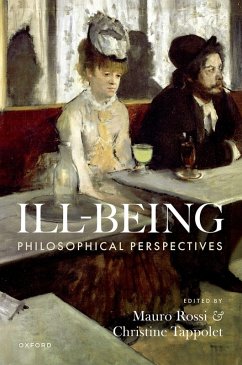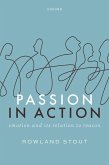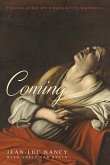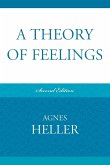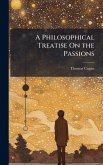- Gebundenes Buch
- Merkliste
- Auf die Merkliste
- Bewerten Bewerten
- Teilen
- Produkt teilen
- Produkterinnerung
- Produkterinnerung
Nearly all of us aspire to live a prudentially good life. To achieve this, we must understand which things are good for us and which things are bad for us -- in other words, we must understand what well-being and ill-being consist in. Ill-Being: Philosophical Perspectives fulfills this endeavour.
Andere Kunden interessierten sich auch für
![Passion in Action Passion in Action]() Rowland StoutPassion in Action97,99 €
Rowland StoutPassion in Action97,99 €![Fearing Together Fearing Together]() Ami HarbinFearing Together86,99 €
Ami HarbinFearing Together86,99 €![Regret Regret]() Paddy McqueenRegret93,99 €
Paddy McqueenRegret93,99 €![Coming Coming]() Jean-Luc NancyComing73,99 €
Jean-Luc NancyComing73,99 €![Theory of Feelings Theory of Feelings]() Agnes HellerTheory of Feelings56,99 €
Agnes HellerTheory of Feelings56,99 €![A Philosophical Treatise On the Passions A Philosophical Treatise On the Passions]() Thomas CoganA Philosophical Treatise On the Passions36,99 €
Thomas CoganA Philosophical Treatise On the Passions36,99 €![The Basic Writings of Bertrand Russell The Basic Writings of Bertrand Russell]() Bertrand RussellThe Basic Writings of Bertrand Russell236,99 €
Bertrand RussellThe Basic Writings of Bertrand Russell236,99 €-
-
-
Nearly all of us aspire to live a prudentially good life. To achieve this, we must understand which things are good for us and which things are bad for us -- in other words, we must understand what well-being and ill-being consist in. Ill-Being: Philosophical Perspectives fulfills this endeavour.
Produktdetails
- Produktdetails
- Verlag: Oxford University Press
- Seitenzahl: 336
- Erscheinungstermin: 3. Oktober 2025
- Englisch
- Abmessung: 213mm x 160mm x 20mm
- Gewicht: 658g
- ISBN-13: 9780192865410
- ISBN-10: 0192865412
- Artikelnr.: 73516642
- Herstellerkennzeichnung
- Libri GmbH
- Europaallee 1
- 36244 Bad Hersfeld
- gpsr@libri.de
- Verlag: Oxford University Press
- Seitenzahl: 336
- Erscheinungstermin: 3. Oktober 2025
- Englisch
- Abmessung: 213mm x 160mm x 20mm
- Gewicht: 658g
- ISBN-13: 9780192865410
- ISBN-10: 0192865412
- Artikelnr.: 73516642
- Herstellerkennzeichnung
- Libri GmbH
- Europaallee 1
- 36244 Bad Hersfeld
- gpsr@libri.de
Mauro Rossi is a Full Professor in the Department of Philosophy at the University of Quebec in Montreal. His research interests are in value theory, prudential psychology, and the philosophy of economics. He has published articles in journals such as the Canadian Journal of Philosophy, Economics and Philosophy, Ergo, Synthese and Utilitas. With Christine Tappolet, he is working on a monograph provisionally entitled Happiness: An Affective Theory. Christine Tappolet is a Full Professor in the Department of Philosophy at the University of Montreal. Her research interests lie mainly in metaethics, moral psychology, and emotion theory. She has edited a number of volumes, including, with Sarah Stroud, Weakness of Will and Practical Irrationality (OUP, 2003). Tappolet is also the author of several books, including Emotions, Values, and Agency (OUP, 2016) and Philosophy of Emotions: A Contemporary Introduction (Routledge, 2023). With Mauro Rossi, she is currently working on a monograph on well-being.
* Introduction
* 1: Raffaele Rodogno: The Significance of Ill-Being
* 2: Christopher Frugé: Combining Good and Bad
* 3: Willem van der Deijl: Well-Being, Ill-Being, and Everything in
Between: What Does It Mean for Well-Being to Come in Degrees?
* 4: Anthony Kelley: What Should the Desire Theorist Say About
Ill-Being?
* 5: Qiannan Li and Valerie Tiberius: Adaptive Values and Subjective
Ill-Being
* 6: Jason R. Raibley: Pleasure and Pain in Value-Fulfilment Theories
of Well-Being and Ill-Being
* 7: Jennifer Hawkins: Explaining Emotional Pain with Affective
Perspectives
* 8: Lorraine L. Besser: Why Is the Boring Bad?
* 9: Mauro Rossi and Christine Tappolet: Ill-Being and Fitting
Unhappiness
* 10: Daniel M. Haybron: Well-Being and the Problem of Suffering
* 11: Antti Kauppinen: Telic Perfectionism and the Badness of Pain
* 12: Eric Mathison: Anti-Achievement
* 13: Gwen Bradford: Failure
* 14: Teresa Bruno-Niño and Hasko von Kriegstein: Ill-Being as
Dissonance
* 15: Nicole Hassoun: Health and the Minimally Good Life-What Is Really
Necessary to Avoid Ill-Being and (Otherwise) Fare Well Enough
* 1: Raffaele Rodogno: The Significance of Ill-Being
* 2: Christopher Frugé: Combining Good and Bad
* 3: Willem van der Deijl: Well-Being, Ill-Being, and Everything in
Between: What Does It Mean for Well-Being to Come in Degrees?
* 4: Anthony Kelley: What Should the Desire Theorist Say About
Ill-Being?
* 5: Qiannan Li and Valerie Tiberius: Adaptive Values and Subjective
Ill-Being
* 6: Jason R. Raibley: Pleasure and Pain in Value-Fulfilment Theories
of Well-Being and Ill-Being
* 7: Jennifer Hawkins: Explaining Emotional Pain with Affective
Perspectives
* 8: Lorraine L. Besser: Why Is the Boring Bad?
* 9: Mauro Rossi and Christine Tappolet: Ill-Being and Fitting
Unhappiness
* 10: Daniel M. Haybron: Well-Being and the Problem of Suffering
* 11: Antti Kauppinen: Telic Perfectionism and the Badness of Pain
* 12: Eric Mathison: Anti-Achievement
* 13: Gwen Bradford: Failure
* 14: Teresa Bruno-Niño and Hasko von Kriegstein: Ill-Being as
Dissonance
* 15: Nicole Hassoun: Health and the Minimally Good Life-What Is Really
Necessary to Avoid Ill-Being and (Otherwise) Fare Well Enough
* Introduction
* 1: Raffaele Rodogno: The Significance of Ill-Being
* 2: Christopher Frugé: Combining Good and Bad
* 3: Willem van der Deijl: Well-Being, Ill-Being, and Everything in
Between: What Does It Mean for Well-Being to Come in Degrees?
* 4: Anthony Kelley: What Should the Desire Theorist Say About
Ill-Being?
* 5: Qiannan Li and Valerie Tiberius: Adaptive Values and Subjective
Ill-Being
* 6: Jason R. Raibley: Pleasure and Pain in Value-Fulfilment Theories
of Well-Being and Ill-Being
* 7: Jennifer Hawkins: Explaining Emotional Pain with Affective
Perspectives
* 8: Lorraine L. Besser: Why Is the Boring Bad?
* 9: Mauro Rossi and Christine Tappolet: Ill-Being and Fitting
Unhappiness
* 10: Daniel M. Haybron: Well-Being and the Problem of Suffering
* 11: Antti Kauppinen: Telic Perfectionism and the Badness of Pain
* 12: Eric Mathison: Anti-Achievement
* 13: Gwen Bradford: Failure
* 14: Teresa Bruno-Niño and Hasko von Kriegstein: Ill-Being as
Dissonance
* 15: Nicole Hassoun: Health and the Minimally Good Life-What Is Really
Necessary to Avoid Ill-Being and (Otherwise) Fare Well Enough
* 1: Raffaele Rodogno: The Significance of Ill-Being
* 2: Christopher Frugé: Combining Good and Bad
* 3: Willem van der Deijl: Well-Being, Ill-Being, and Everything in
Between: What Does It Mean for Well-Being to Come in Degrees?
* 4: Anthony Kelley: What Should the Desire Theorist Say About
Ill-Being?
* 5: Qiannan Li and Valerie Tiberius: Adaptive Values and Subjective
Ill-Being
* 6: Jason R. Raibley: Pleasure and Pain in Value-Fulfilment Theories
of Well-Being and Ill-Being
* 7: Jennifer Hawkins: Explaining Emotional Pain with Affective
Perspectives
* 8: Lorraine L. Besser: Why Is the Boring Bad?
* 9: Mauro Rossi and Christine Tappolet: Ill-Being and Fitting
Unhappiness
* 10: Daniel M. Haybron: Well-Being and the Problem of Suffering
* 11: Antti Kauppinen: Telic Perfectionism and the Badness of Pain
* 12: Eric Mathison: Anti-Achievement
* 13: Gwen Bradford: Failure
* 14: Teresa Bruno-Niño and Hasko von Kriegstein: Ill-Being as
Dissonance
* 15: Nicole Hassoun: Health and the Minimally Good Life-What Is Really
Necessary to Avoid Ill-Being and (Otherwise) Fare Well Enough

